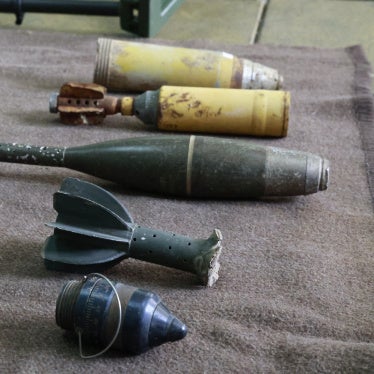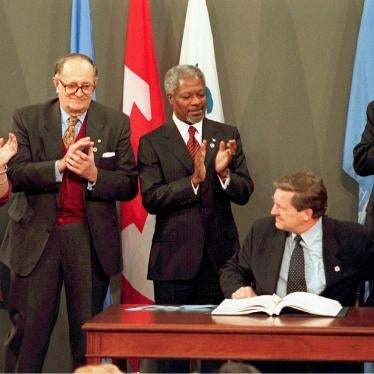Distinguished delegates, colleagues, and friends,
It gives me great pleasure to return to Maputo, where I had the honor of delivering the keynote address for the ICBL in 1999 during the First Meeting of States Parties. That was a very exciting time, one filled with ambition and creativity, with deep commitment and conviction, and with great optimism that the new form of diplomacy we were pioneering, now called humanitarian disarmament, would succeed in ending the global scourge caused by antipersonnel landmines. We were convinced that the unprecedentedly close partnership of civil society, governments, the ICRC and UN agencies would prevail and accomplish things that the many naysayers said would be impossible: a halt to the use, production, trade, and stockpiling of antipersonnel mines, clearance of mine affected nations in our lifetime, no new mine victims, and a world where the rights of survivors are respected and their needs met.
Fifteen years later, our progress toward all of these objectives is nothing short of remarkable. The weapon has been thoroughly stigmatized, so that almost all those still outside the treaty already comply with its key provisions. Use, production, and trade are almost non-existent. In the past few years, the only government forces to lay antipersonnel mines were in Syria and Burma, governments that flout international opinion and norms. More than 47 million stockpiled mines have been destroyed by States Parties, and tens of millions more by those not party.
Twenty-seven states have declared their land cleared of mines, with thousands of square kilometers of contaminated land now available for productive use. The mine ban movement gave birth to the concept of humanitarian demining, now a highly developed field with international standards. In 1999, the common estimate was 26,000 people killed or injured by mines and explosive remnants of war each year. Today, we record fewer than 4,000. The priority now given to and the advances in victim assistance are the result of States Parties’ commitment to this emerging norm.
And the model of humanitarian disarmament has been succeeding as well, most notably in the case of cluster munitions, but also, in varying respects, with the child soldiers campaign, the International Criminal Court, and the Arms Trade Treaty, as well as the emerging international efforts on the humanitarian impact of nuclear weapons, the use of explosive weapons in populated areas, and killer robots.
But we are all also acutely aware that we have not crossed the finish line in the ban on and eradication of antipersonnel mines. Indeed, in recent years, concerns with treaty compliance have risen, most notably with Yemen’s acknowledgement of use by government forces in 2011-2012, and use allegations in Sudan and elsewhere. There are also the missed stockpile destruction deadlines, the missed mine clearance deadlines, the very low rate of transparency reporting, and the mines being retained that are not being used for permitted purposes.
States Parties cannot shy away from these compliance issues, and how States Parties address them is key to the strength, credibility, and humanitarian impact of the treaty. In this respect, we are very pleased with the creation of a new compliance committee to lead the way in identifying, examining, and resolving compliance concerns in a cooperative manner—while bearing in mind that all States Parties must be involved and take responsibility for ensuring full implementation of and compliance with the treaty.
Mr. President, despite the fact that so many States Parties have missed their Article 5 clearance deadline and asked for an extension, or extensions, we believe that the end to contamination in States Parties is in sight. Most should be able to complete in five years, and all within 10 years. To make this happen, states will need to prioritize mine action in their development goals, through national funding, and politically. Political will and prioritization are the keys; they can overcome the laundry list of obstacles to clearance we have heard over the years. We are pleased that States Parties have expressed great concern that Ethiopia has failed to submit an extension request, and thus is in danger of violating the treaty.
With respect to victim assistance, while for the most part governments have the plans and the tools, they need to do much more to uphold their commitments to the rights of survivors, including the rights to education, employment, and health care. The need is especially acute for survivors living far from urban centers to have these rights realized. All survivors should have full, legally protected access to the services and programs they need. Survivor voices must be a part of any discussion that will affect them, such as development or disability plans.
Universalization is also an unfinished job. We warmly welcome the statement by the United States this morning that it intends to accede to the Mine Ban Treaty in the future, and is as of now prohibiting any future production of antipersonnel mines. This again reinforces that the treaty is the only solution to the landmine problem, and that antipersonnel mines are no longer legitimate weapons. We urge the US to go further and set a target date to accede, to commit to no use until it has acceded, and to begin stockpile destruction now.
Mr. President, while remaining challenges are great, they are by no means insurmountable, or even overwhelming. The ICBL has issued a Completion Challenge to States Parties, asking them to commit to complete all major treaty obligations within the next decade. There is no doubt on our part, based on expert analysis by our field-based operators, that this can be accomplished. Indeed, these obligations can and should be met by most States Parties that have not already done so within five years or less. We have been pleased this week with how States Parties have embraced the notion of completion and the deadline of 2025.
Meeting the challenge will take renewed determination, sufficient resources, and the use of good practices. It will take what might be called the Spirit of Maputo in 1999. Let’s let the rest of the world know that a mine-free world is not a pipedream. It is not a centuries or even decades-long endeavor anymore. Let’s imagine no more use of antipersonnel mines; no more contaminated land; no new mine casualties; and a world where survivors are assured of the services they need. Let’s rise to the challenge and make it happen within a decade.
Thank you.








